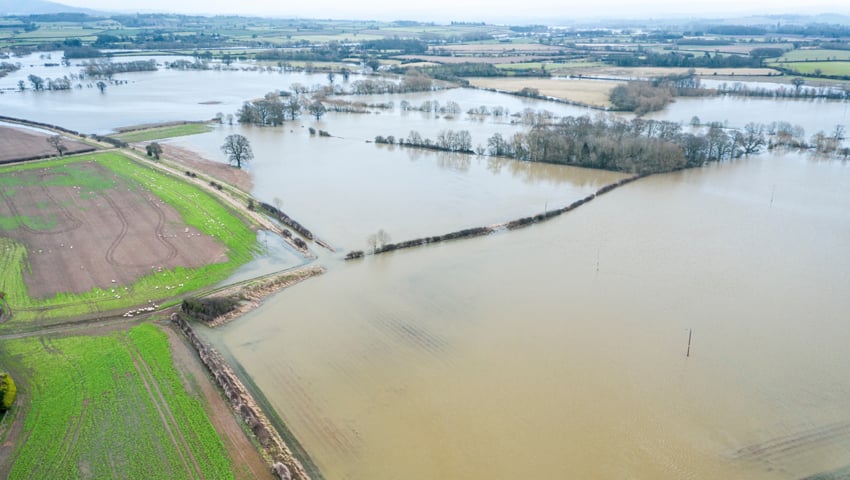Defra has removed the 150m rule from its Farming Recovery Fund, which aims to support farmers affected by flooding. The 150m limit meant that farmers who were more than 150m from main rivers were not eligible for funding support.
The NFU had raised concerns over implementation of the Farming Recovery Fund which opened last week to support farmers affected by flooding from Storm Henk. Eligible farmers are set to access grant support of up to £25,000.
The NFU said it had heard from numerous members who had suffered catastrophic impacts who had been told they were not eligible for the fund because some of their affected areas are more than 150 metres from ‘main’ rivers. These included members with 90% of their land saturated or underwater, with huge damage to buildings and equipment.
Defra said, “Following feedback from farmers, the eligibility criteria for the scheme has been updated to fully remove the 150m limit. This means that farmers will be able to receive payments for all land parcels which are flooded contiguous to an eligible river.”
Who is eligible?
The grant is to support the cost of recultivating and reinstating agricultural land that was flooded due to notably high river levels between 2-12 January 2024, caused by Storm Henk.
The RPA (Rural Payments Agency) is administering the fund on behalf of Defra, with landowners or tenant farmers who occupied eligible land parcels at the time of Storm Henk able to claim £130 per hectare for recultivation work.
Eligible farmers can access grants of between £500 and £25,000 to return their land to the condition it was in before exceptional flooding due to Storm Henk.
The eligible counties and rivers announced at this time are listed below:
- Gloucestershire – River Severn, River Thames and River Avon
- Leicestershire – Rothley Brook, River Wreake and River Soar
- Lincolnshire – River Witham, River Brant, River Welland, River Ancholme
- Nottinghamshire – River Trent, River Devon and River Soar
- Somerset – River Brue, River Exe, River Parrott and River Tone
- Warwickshire – River Avon and River Leam
- West Northants – River Nene and River Gt Ouse
- Wiltshire – River Avon (Hants), River Avon (Bristol), River Kennet, River Thames, River Bourne and River Wylye
- Worcestershire – River Severn, River Teme and River Avon
Counties under review at this stage are Berkshire, Herefordshire, Oxfordshire, Surrey, Staffordshire, Yorkshire, Norfolk and Derbyshire. The NFU pressed for the inclusion of additional counties, following feedback from its membership.
How to claim
The RPA is contacting those landowners and tenant farmers that they believe are eligible having used satellite imagery and river gauge level data to work out which land parcels were flooded between 2-12 January 2024.
The following criteria will also be taken into account when contacting those eligible:
- Eligible agricultural land parcels must be located within 150m of the midpoint of a named river within specific counties.
- Land will not be eligible if it is in a designated flood storage area.
- Land parcels included under the Countryside Stewardship scheme that have flood resilience options (SW12, 15 and 16) claimed are not eligible.
- Land parcels must be registered as agricultural land in the Rural Payments service.
The RPA will be emailing landowners or tenant farmers identified as eligible with details of their eligible land parcels and links to the download table claim form and full guidance.
You will not be expected to have completed the recultivation work at the time of submitting a claim but commit that the work will be completed by the end of September 2024. The deadline for submitting a claim is 10 July 2024.
More information about the fund and the eligibility criteria will be available through Farming Recovery Fund guidance produced by the RPA.
The Farming Recovery Fund is triggered following exceptional weather events and was last made available in 2019/20.
